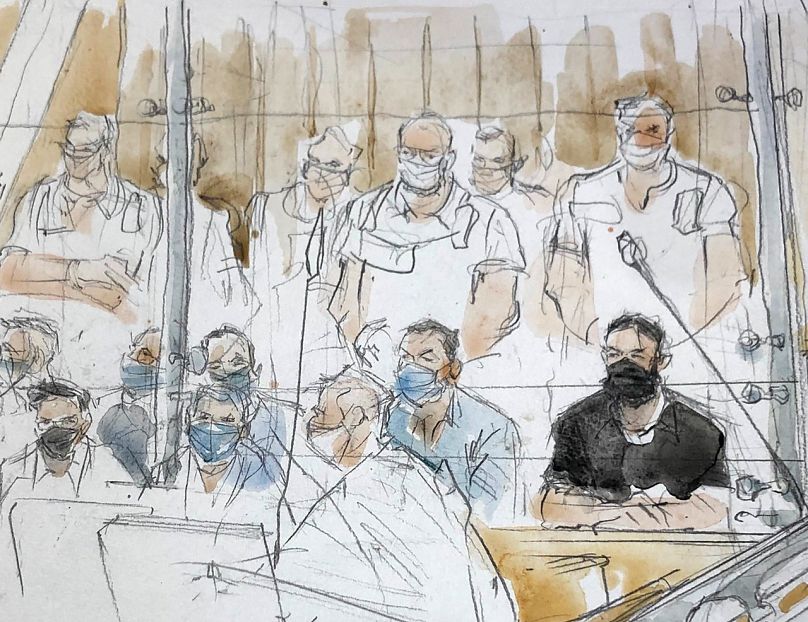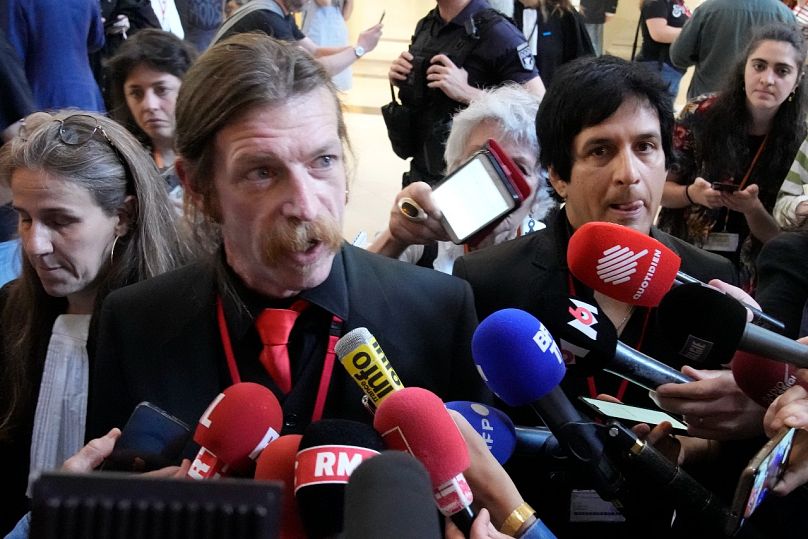Verdicts are due later on Wednesday in the trial of 20 men following the November 2015 attacks in Paris, the worst on French soil since World War II.
The biggest trial in France's history is expected to deliver a verdict on Wednesday.
Salah Abdeslam and 19 other men are in the dock over the country's worst peacetime attacks, which happened in Paris on 13 November 2015.
They are accused of playing critical roles in the gun and bomb attacks that left 130 people dead and 350 injured across the French capital.
The trial has taken 10 months and involved more than a million pages of evidence, so here are some of the pivotal moments.
1. France's biggest trial gets under way — 8 September 2021
Nearly six years after the attacks at the Bataclan concert hall, Stade de France stadium, bars and restaurants, the trial got under way amid heightened security.
The hearings took place in a room specially built for the occasion in a former courthouse in Paris. At the opening, experts estimated the trial should last nearly nine months, an unprecedented length for a criminal hearing in France. It has actually lasted 10 months.
The court was trying 20 defendants, including Abdeslam, allegedly the only member of the attack commando group still alive.
The 32-year-old said he wanted to testify that "there is no God apart from Allah and that Mohamed is his messenger," adding that he has been "treated like a dog" in custody.
"It's a provocation, we expected it and in actual fact we're expecting absolutely nothing," Dominique Kielemoes, whose son was killed in the shootings at the bar La Belle Equipe, said outside the courtroom.
2. 'A carpet of bodies everywhere': First policeman to arrive at Bataclan concert hall — 22 September 2021
Over the trial's first weeks, an overview was given of the sprawling Franco-Belgian investigation and the first evidence collected at the attack crime scenes.
One testimony, in particular, stood out: that of the first policeman to arrive at the Bataclan concert hall.
The attack saw 89 people killed as Kalashnikov-type assault rifles were fired into the packed crowd, who were enjoying an Eagles of Death Metal concert.
His testimony was chilling. He said he arrived to find a scene of chaos: bodies on the floor, barriers in front of the venue had been knocked down on the pavement, and a man was shouting on his phone: "There's an attack!"
He heard gunfire inside.
"Suddenly," the doors of the venue flew open, and "a compact mass ran towards us, screaming". He raised the alarm, then "we had to make a decision".
"In front of us, swinging doors, the unknown. We didn't know the configuration of the place. The only thing we knew for sure was that there were terrorists slaughtering innocent people and waiting for us with weapons of war."
"We have to go in," he recalled telling his partner.
"Bodies, a carpet of bodies, bodies everywhere, entangled," was what awaited them inside. "No words can describe what we saw," he tells the court.
What was particularly striking, he noted, was the "contrast" from the chaos of gunshots and screams to "nothing, not a sound".
"The smoke from the shots was still in the air," he went on, when he heard a voice, turned around, and saw one of the three assailants holding a spectator at gunpoint and yelling at him to "get down on the ground".
"The man moves forward, hands on his head, looking resigned, he starts to kneel down," he said.
The officers took up their position and fired six times. The assailant collapsed but triggered his explosive belt, resulting in "a shower of confetti" of "human flesh", the superintendent recalled.
Shot at, they sheltered and took a moment to say "goodbye" to their loved ones, he says. "My teammate by SMS, me by phone, 5-6 seconds maximum, without waiting for the answer".
As one of the lawyers for the complainants put it, the policeman was one of those "heroes" who came to the aid of the victims that night.
3. 'It wasn’t France’s fault, but that of another country': France's former president François Hollande gives evidence — 10 November 2021
François Hollande was France's president at the time of the attacks and was called to testify by the victims' association Life for Paris — the first time a former head of state has given evidence in a criminal court.
He detailed the decisions taken "during this disastrous night", but also those of the months which preceded and followed it.
Hollande admitted intelligence failures ahead of the attack and took a swipe at Belgium for hindering efforts to shut their shared border.
Even before the assault was over, with the death toll rising and the horror of the violence sinking in, Hollande declared a state of emergency and ordered the frontiers closed. Hours later, Salah Abdeslam, today the sole surviving attacker, fled to Belgium.
“It wasn’t France’s fault, but that of another country,” Hollande told the court of Abdeslam’s escape from France.
At the time of the Paris attack, France had been on high alert following militant attacks on the Charlie Hebdo satirical magazine and a kosher supermarket in the capital in January of the same year.
Several of the 10 attackers slipped into Europe from Islamic State strongholds in Syria, using fake passports and mixing with migrants fleeing war and poverty.
Hollande challenges the militants' accusations over French foreign policy, pointing out that the group that carried out the Paris November attacks had formed well before France launched air strikes in Syria.
4. Trial interrupted by COVID — 4 January 2022
At the end of December, Salah Abdeslam tested positive for COVID-19.
The trial was supposed to resume on 4 January, following the New Year break. But COVID disrupted the proceedings. "I hope that we will finish this trial in 2022", court president Jean-Louis Périès said.
In total, six of the 11 defendants are struck by the coronavirus, forcing the hearings to be suspended each time.
Three public prosecutors also contracted it, one of them during Abdeslam's long-awaited accounts of 13 November. He had to send questions remotely to his colleagues.
The trial, initially scheduled to end at the end of May, would not now in fact finish until the end of June.
5. 'I ask you to hate me in moderation': Salah Abdeslam offers 'apologies' to victims — 15 April 2022
After years of silence, there was much anticipation over what Abdeslam — who admitted being a member of IS and whose brother Brahim was one of the attackers — would say in court.
On the final day of his testimony, he offered his "condolences and apologies" to all the victims.
"I ask you to forgive me, I know that hatred remains ... I ask you today to hate me in moderation," he says.
Abdeslam told the trial he was meant to detonate a suicide belt on the night of the attacks but changed his mind. Questioned by his defence lawyer, he said he did not regret failing to carry out the plan.
Gérard Chemla, a lawyer for 100 victims, said neither he nor his clients were "moved" by the defendant's testimony.
In this "constructed and polished speech", he "cried about himself and his friends, not about the victims", Chemla added.
6. 'You can’t kill rock’n’roll': Eagles of Death Metal give evidence — 17 May 2022
"These events have changed my life forever".
The American rock band Eagles of Death Metal were performing at the Bataclan on the night of the November 2015 attacks, and lead singer Jesse Hughes gave evidence.
Hughes recalled the moment the assailants burst through the hall's main entrance and opened fire on the crowd.
"Being from a desert community in California, I know the sound of gunshots," he told the court, visibly emotional. "I knew that death was coming," he said, adding that the band “ran for their lives”.
He also spoke of his difficulty in putting his life back together, and his feeling of guilt. "Nearly 90 of my friends were murdered in front of us," he said. "I think about the families of the victims every day."
Hughes finished his testimony by quoting former Black Sabbath singer Ozzy Osbourne. "Evil did not win," he said. "You can't kill rock and roll."
Guitarist Eden Galindo told the court he escaped the Bataclan through a side door, unaware whether the gunmen were chasing them. He said he eventually sheltered in a police station “with others there covered in blood”.
"I live a different life. I’ll never be the same," the guitarist said, adding that he too thinks of the victims’ families and prays for them every day.
7. 'He never expressed the slightest remorse': Prosecutors' closing speeches — 8-10 June 2022
The three public prosecutors summed up their arguments and asked for sentences ranging from five years to life imprisonment for the 20 defendants.
The life requests are reserved for Salah Abdeslam, as well as two senior IS members presumed dead in Iraq or Syria and tried in their absence. They also asked for life for the Belgian Mohammed Abrini, the so-called "man in the hat" in the 2016 Brussels attacks, with a 22-year minimum term.
The requested term for Abdeslam — a mandatory life sentence without parole — is the heaviest in the French penal code. The prosecution believes the defendant "remained faithful to his ideology to the end" and never expressed "the slightest remorse".
8. 'Neither psychopath nor sociopath': Conclusion of defence pleas — 24 June 2022
Olivia Ronen, one of Abdeslam's two lawyers, appealed to the court as two weeks of defence arguments drew to a close.
"I am not asking you for courage. I am asking you to apply the law with all the rigour that your conscience demands," she says.
Her client — who has pleaded to avoid life imprisonment — should not be sentenced to "a social death penalty", Ronen said.
She told the court the mandatory life term as demanded by the prosecution had only been handed down four times, for crimes committed against minors by men who were all recognised as "psychopaths in the psychiatric sense of the term".
Abdeslam is "neither psychopath nor sociopath", he is only a "deserter executor" who "did not kill", the criminal lawyer insists.
The verdict of the trial is due to be delivered on Wednesday 29 June.













